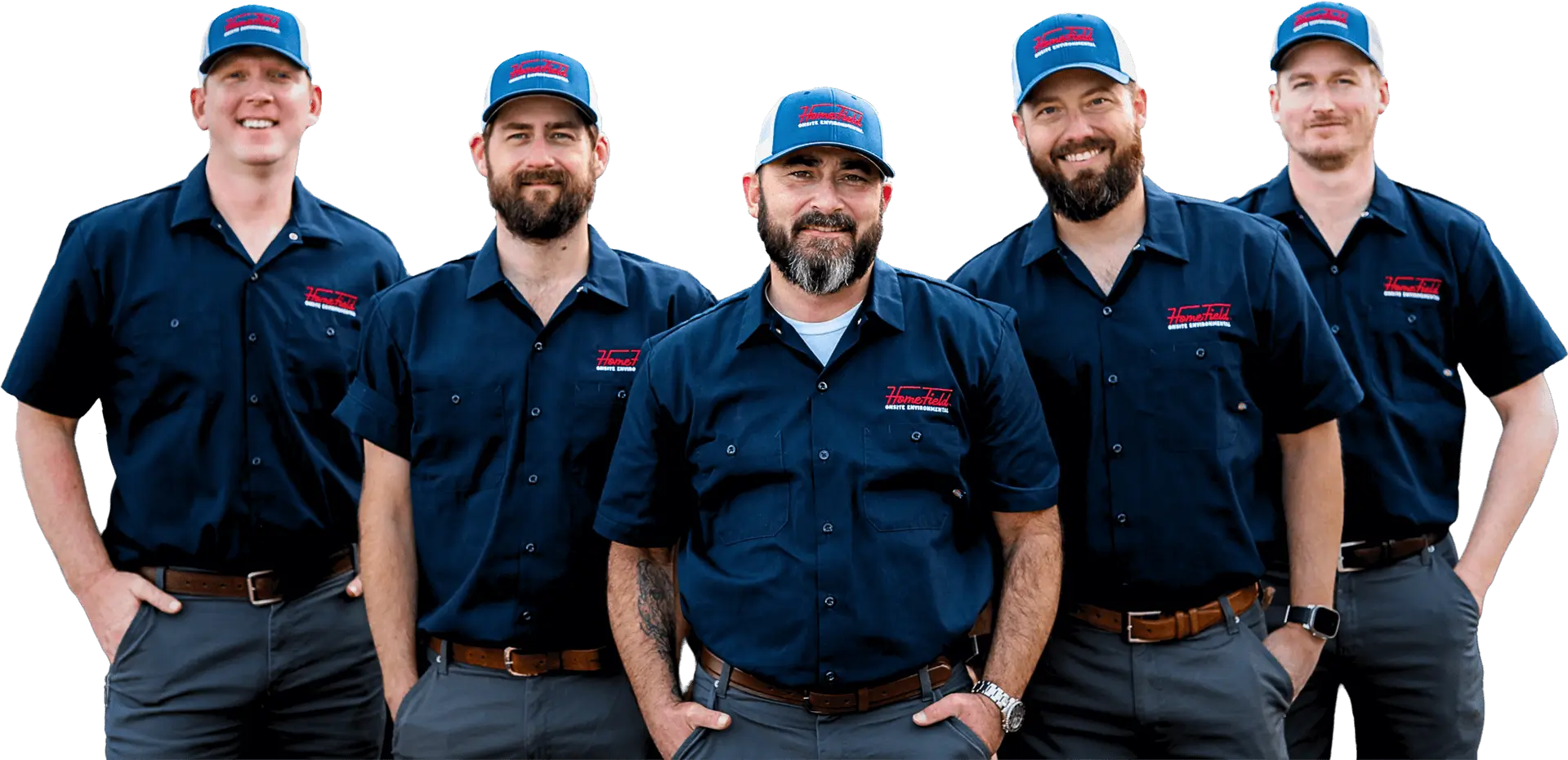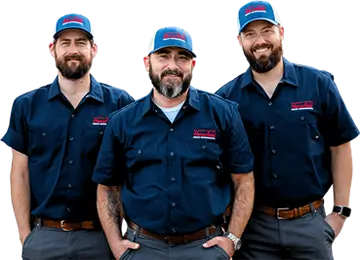Commercial Septic Installation Services In Ellis County
Good Septic Installs Is Our Business
Looking for a new commercial septic system? Your local HomeField team will match you with the perfect system and install it for you.
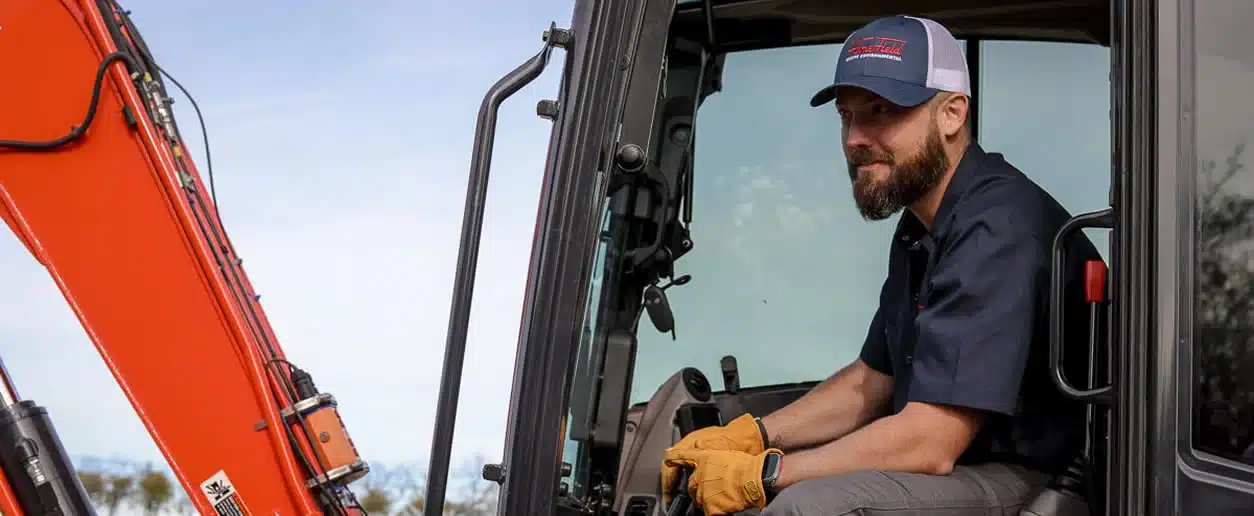
We’ll make sure your next commercial septic system installation meets the needs of your business while also meeting all local Ellis County regulations.
How Can We Help?

What To Consider With
A Septic Install
Whether you’re starting a new venture or have outgrown your old septic system, our commercial septic installations get you the right system for your business needs.
Top Questions To Consider:
- Are You Needing A Completely New System?
- Did Something Damage Your Old System?
- Or Did You Outgrow Your Old Septic System?
- Is Your Septic System Up To Code?
- Does Your Current System Allow For Growth?
Put Your Shovel Down And Let Us Install Your Commercial Septic System
WHAT YOU SHOULD KNOW ABOUT
Commercial Septic Installation
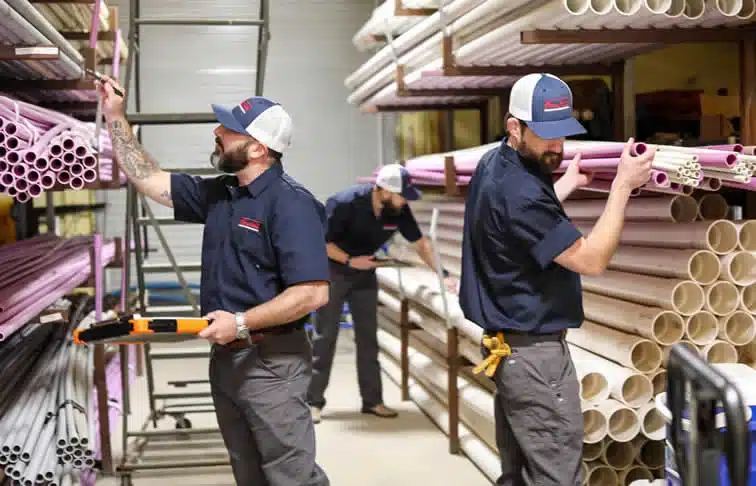
What Type Of Septic System Is Best For Your Business?
Choosing the right septic system for your business involves balancing a lot of factors. Your location, soil conditions, and local regulations all need to balance with the size of your property, your expected usage needs,
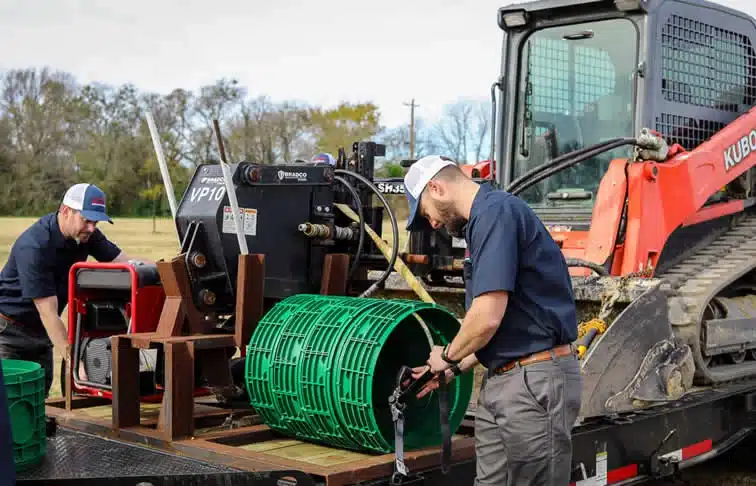
What Does A Commercial Septic Installation Cost?
There’s no cookie-cutter answer for this one. So much of it depends on the type of system you choose, the size of the tanks you need and the drainfields you need to support the tanks, and how easy it is to access your property and do the actual installation work. From
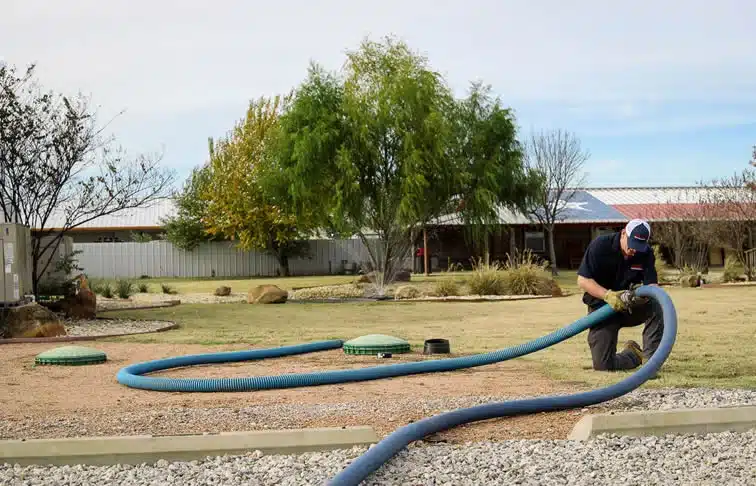
What Are You Responsible For As A New Septic Owner?
As the owner of a commercial septic system, it’s your responsibility to understand, observe, and follow all the safety rules and requirements for your septic system. We have Commercial Advantage Plans to help keep your system running smoothly with regular inspections
- Don’t operate vehicles near or on your system. That’s an easy way to damage your tank(s) or disposal field.
- The system will never produce water that’s safe for human or animal consumption, so keep your children and any animals away from your system and its components.
- Don’t put any non-biodegradable materials (i.e. plastics, coffee grounds, etc.), chemicals, solvents, grease, oil, paints or any other type of non-domestic wastewater into your system.
If you have an aerobic system, you’ll also want to make sure your aerator isn’t being affected by water, fire ants, or rodents. Also, please don’t try to service your system yourself without training. There’s a real risk of severe electrical shock.
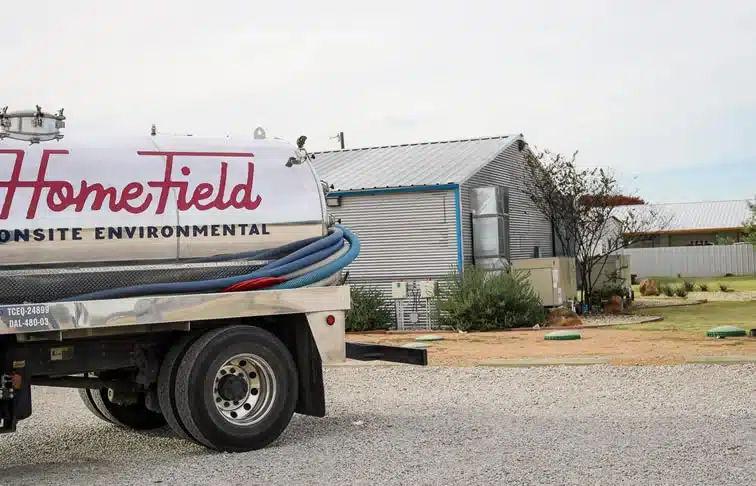
How Long Is The Process To Install A New Septic System?
Would you hate it if we said it depends? Residential systems can typically be installed within a few weeks, but there are more factors to consider with commercial, and more regulations to make sure we follow. The type of system you want to install (aerobic or conventional),
The septic maintenance and operation requirements for Ellis County, Texas, outside of city limits are primarily governed by the Texas Commission on Environmental Quality (TCEQ) regulations and enforced by the Ellis County Department of Development. System maintenance requirements include the following: Routine Pumping: Septic tanks must be pumped out periodically to remove sludge and scum build-up. The frequency depends on the tank size and household usage but is generally every 3-5 years. Any repairs must comply with TCEQ regulations and may require approval or permitting from Ellis County. Aerobic systems require a maintenance contract with a licensed service provider for the life of the system. Do not allow grease, oils, chemicals, or non-biodegradable materials to enter the system. Avoid overloading the system with excessive water use. Fix leaking faucets and spread out laundry loads. Do not park vehicles, plant trees, or build structures over the drain field. Maintain proper grading to prevent erosion or runoff. An aerobic septic system in Ellis County, Texas, is an on-site sewage facility (OSSF) designed to treat and dispose of wastewater using aerobic (oxygen-loving) bacteria. These systems are often used in areas where traditional septic systems are not feasible due to soil conditions, space limitations, or environmental concerns. The system introduces air into the wastewater treatment process to promote the growth of aerobic bacteria, which break down organic matter more effectively than anaerobic bacteria used in conventional systems There are 4 treatment component steps of an Aerobic Septic System. Setbacks: Systems must meet distance requirements from property lines, water wells, and surface water. Address: 109 S. Jackson St., Waxahachie, TX 75165 Current regulations do not give homeowners the opportunity to maintain or repair their own OSSF systems. You must use a licensed OSSF expert. Your site must be evaluated by a licensed site evaluaor or a license engineer. The table in this link will provide the information needed to determine what type of system you will need: https://www.tceq.texas.gov/permitting/ossf/ossfsystems.html Watch what you put down the drain. Fats, grease and solids, even coffee grinds can clog your system. Even with the use of a garbage disposal. Don't overload your toilet. Keep your septic area clear of trees, shrubs and roots as these can clog and damage your septic system. Check your yard regularely for leaks or sign of improper drainage. Have your system inspected and maintained by your county and city requirements. Region 4, Dallas/Fort Worth You can call 817-588-5800, or write to Ellis County DOD 2309 Gravel Drive Fort Worth, TX 76118. The size of your septic tank depends on household size and water usage. Texas regulations typically require larger tanks for homes with more bedrooms or higher water demand. For example, a three-bedroom home may need a tank with a minimum capacity of 1,000 gallons. The class of soil required for an aerobic septic system (commonly called an aerobic treatment unit, or ATU) depends on its ability to handle treated wastewater effectively. Aerobic systems are often used when soil conditions are not suitable for conventional septic systems. Here's an overview of soil considerations for aerobic systems: Soil Requirements for an Aerobic System All septic systems, regardless of location, must comply with the Texas Commission on Environmental Quality (TCEQ) standards. The Ellis County Department of Development (DoD) oversees permitting for on-site sewage facilities (OSSFs), but additional requirements may apply within city limits. You have to determine the regulatory authority for your city. Inside city limits, the city may have its own permitting process in addition to Ellis County’s requirements. Obtain an application from the Ellis County Department of Development or the city (if applicable). It must include a site evaluation and soil test conducted by a licensed professional. A system design prepared by a licensed engineer along with a property plat or site plan showing the setback and system layouts. On-site sewage facilities, or OSSFs, must be designed on the basis of a site evaluation that accounts for local conditions. It's the system of choice for approximately 20% of the new homes built in Texas...an On-Site Sewage Facility (OSSF), commonly called a "septic system." The sudden increase of new housing in suburban and rural areas means that more Texas households depend on an OSSF for treatment and disposal of domestic sewage. In recent years many new systems have been permitted, most in high growth areas of the state. New approaches to design and overseeing OSSFs ensure systems do their job properly and protect the environment. Properties within city limits may be subject to both county and city regulations. Although, Ellis County Department of Development still oversees TCEQ-mandated requirements for on site sewage facitlites (OSSF), your city authorities may impose additional regulations. These regulations and contact information can be answered by selecting city specific Permit Application questions in these FAQs. Cities may charge separate fees for their approval process and inspections. Within the city limits city inspectors may work with county inspectors. An aerobic septic system in Ellis County, Texas, is an on-site sewage facility (OSSF) designed to treat and dispose of wastewater using aerobic (oxygen-loving) bacteria. These systems are often used in areas where traditional septic systems are not feasible due to soil conditions, space limitations, or environmental concerns. All septic systems, regardless of location, must comply with the Texas Commission on Environmental Quality (TCEQ) standards. The Ellis County Department of Development (DoD) oversees permitting for on-site sewage facilities (OSSFs), but additional requirements may apply within city limits. You have to determine the regulatory authority for your city. Inside city limits, the city may have its own permitting process in addition to Ellis County’s requirements. Obtain an application from the Ellis County Department of Development or the city (if applicable). It must include a site evaluation and soil test conducted by a licensed professional. A system design prepared by a licensed engineer along with a property plat or site plan showing the setback and system layouts. The system introduces air into the wastewater treatment process to promote the growth of aerobic bacteria, which break down organic matter more effectively than anaerobic bacteria used in conventional systems For properties located inside city limits in Ellis County, Texas, septic maintenance and operation requirements are primarily guided by Texas Commission on Environmental Quality (TCEQ) regulations, but additional rules may apply depending on the specific city’s ordinances. See city specific FAQs for further detail. We recommend that you contact your cities permitting office for detailed information. In summary, conventional septic systems should have the tanks pumped every 3-5 years to prenent sludge build up and system failure. Regular inspections will be required by a licesnes provider. Any repairs must meet the TCEQ standards and may require city approval. for Aerobic Treatment Units you will need maintenance contracts by a licensed provider. A contract should include periodic inspections, testing and maintenance 3 times per years or as required by your city permit. Systems using chlorine disinfection must have chlorine tablets replenished regularly with septic-safe chlorine products. There are 4 treatment component steps of an Aerobic Septic System. Maintenance reports for aerobic systems must be submitted by licensed providers and submitted in a timely manner. Homeowners should maintain records of maintenance, pumping and repair activities. Further requirements for an outside cities can be found in other FAQs for that city. Setbacks: Systems must meet distance requirements from property lines, water wells, and surface water. The system design must comply with TCEQ Chapter 285 regulations. Some cities may impose additional rules, stricter setbacks and enhanced treatment standards or addtional inspections. Follow your specific city guidelines along with those in the TCEQ Chapter 285 regulations. Address: 109 S. Jackson St., Waxahachie, TX 75165 Setbacks: Systems must meet distance requirements from property lines, water wells, and surface water. See city specifc questions for more detail. Current regulations do not give homeowners the opportunity to maintain or repair their own OSSF systems. You must use a licensed OSSF expert. This will depend on the actual city requirements, not Ellis County Requirements. These regulations and contact information can be answered by selecting city specific Permit Application questions in these FAQs. Your site must be evaluated by a licensed site evaluaor or a license engineer. The table in this link will provide the information needed to determine what type of system you will need: https://www.tceq.texas.gov/permitting/ossf/ossfsystems.html On-site sewage facilities, or OSSFs, must be designed on the basis of a site evaluation that accounts for local conditions. It's the system of choice for approximately 20% of the new homes built in Texas...an On-Site Sewage Facility (OSSF), commonly called a "septic system." The sudden increase of new housing in suburban and rural areas means that more Texas households depend on an OSSF for treatment and disposal of domestic sewage. In recent years many new systems have been permitted, most in high growth areas of the state. New approaches to design and overseeing OSSFs ensure systems do their job properly and protect the environment. Watch what you put down the drain. Fats, grease and solids, even coffee grinds can clog your system. Even with the use of a garbage disposal. Don't overload your toilet. Keep your septic area clear of trees, shrubs and roots as these can clog and damage your septic system. Check your yard regularely for leaks or sign of improper drainage. Have your system inspected and maintained by your county and city requirements. Region 4, Dallas/Fort Worth You can call 817-588-5800, or write to Ellis County DOD 2309 Gravel Drive Fort Worth, TX 76118. The size of your septic tank depends on household size and water usage. Texas regulations typically require larger tanks for homes with more bedrooms or higher water demand. For example, a three-bedroom home may need a tank with a minimum capacity of 1,000 gallons. In the City of Grand Prairie, Texas, the regulation and permitting of on-site sewage facilities (OSSFs), commonly known as septic systems, are managed by the city's Public Health & Environmental Quality Department. They oversee the application, inspection, and approval processes for septic systems within Grand Prairie. https://www.gptx.org/Departments/Public-Health-and-Environmental-Quality/Environmental-Quality/Permits-Policies/On-Site-Sewage/ For detailed information on septic system regulations, permit applications, and requirements, you can contact the Public Health & Environmental Quality Department: It's advisable to reach out to them directly to ensure you receive the most accurate and up-to-date information regarding septic system regulations and permitting processes in your area. The class of soil required for an aerobic septic system (commonly called an aerobic treatment unit, or ATU) depends on its ability to handle treated wastewater effectively. Aerobic systems are often used when soil conditions are not suitable for conventional septic systems. Here's an overview of soil considerations for aerobic systems: Soil Requirements for an Aerobic System An aerobic septic system in Ellis County, Texas, is an on-site sewage facility (OSSF) designed to treat and dispose of wastewater using aerobic (oxygen-loving) bacteria. These systems are often used in areas where traditional septic systems are not feasible due to soil conditions, space limitations, or environmental concerns. All septic systems, regardless of location, must comply with the Texas Commission on Environmental Quality (TCEQ) standards. The Ellis County Department of Development (DoD) oversees permitting for on-site sewage facilities (OSSFs), but additional requirements may apply within city limits. You have to determine the regulatory authority for your city. Inside city limits, the city may have its own permitting process in addition to Ellis County’s requirements. Obtain an application from the Ellis County Department of Development or the city (if applicable). It must include a site evaluation and soil test conducted by a licensed professional. A system design prepared by a licensed engineer along with a property plat or site plan showing the setback and system layouts. The system introduces air into the wastewater treatment process to promote the growth of aerobic bacteria, which break down organic matter more effectively than anaerobic bacteria used in conventional systems For properties located inside city limits in Ellis County, Texas, septic maintenance and operation requirements are primarily guided by Texas Commission on Environmental Quality (TCEQ) regulations, but additional rules may apply depending on the specific city’s ordinances. See city specific FAQs for further detail. We recommend that you contact your cities permitting office for detailed information. In summary, conventional septic systems should have the tanks pumped every 3-5 years to prenent sludge build up and system failure. Regular inspections will be required by a licesnes provider. Any repairs must meet the TCEQ standards and may require city approval. for Aerobic Treatment Units you will need maintenance contracts by a licensed provider. A contract should include periodic inspections, testing and maintenance 3 times per years or as required by your city permit. Systems using chlorine disinfection must have chlorine tablets replenished regularly with septic-safe chlorine products. There are 4 treatment component steps of an Aerobic Septic System. Maintenance reports for aerobic systems must be submitted by licensed providers and submitted in a timely manner. Homeowners should maintain records of maintenance, pumping and repair activities. Further requirements for an outside cities can be found in other FAQs for that city. Setbacks: Systems must meet distance requirements from property lines, water wells, and surface water. The system design must comply with TCEQ Chapter 285 regulations. Some cities may impose additional rules, stricter setbacks and enhanced treatment standards or addtional inspections. Follow your specific city guidelines along with those in the TCEQ Chapter 285 regulations. Address: 109 S. Jackson St., Waxahachie, TX 75165 Setbacks: Systems must meet distance requirements from property lines, water wells, and surface water. See city specifc questions for more detail. Current regulations do not give homeowners the opportunity to maintain or repair their own OSSF systems. You must use a licensed OSSF expert. This will depend on the actual city requirements, not Ellis County Requirements. These regulations and contact information can be answered by selecting city specific Permit Application questions in these FAQs. Your site must be evaluated by a licensed site evaluaor or a license engineer. The table in this link will provide the information needed to determine what type of system you will need: https://www.tceq.texas.gov/permitting/ossf/ossfsystems.html On-site sewage facilities, or OSSFs, must be designed on the basis of a site evaluation that accounts for local conditions. It's the system of choice for approximately 20% of the new homes built in Texas...an On-Site Sewage Facility (OSSF), commonly called a "septic system." The sudden increase of new housing in suburban and rural areas means that more Texas households depend on an OSSF for treatment and disposal of domestic sewage. In recent years many new systems have been permitted, most in high growth areas of the state. New approaches to design and overseeing OSSFs ensure systems do their job properly and protect the environment. Watch what you put down the drain. Fats, grease and solids, even coffee grinds can clog your system. Even with the use of a garbage disposal. Don't overload your toilet. Keep your septic area clear of trees, shrubs and roots as these can clog and damage your septic system. Check your yard regularely for leaks or sign of improper drainage. Have your system inspected and maintained by your county and city requirements. Region 4, Dallas/Fort Worth You can call 817-588-5800, or write to Ellis County DOD 2309 Gravel Drive Fort Worth, TX 76118. The size of your septic tank depends on household size and water usage. Texas regulations typically require larger tanks for homes with more bedrooms or higher water demand. For example, a three-bedroom home may need a tank with a minimum capacity of 1,000 gallons. In the City of Red Oak, Texas, the regulation and permitting of on-site sewage facilities (OSSFs), commonly known as septic systems, are managed by the Ellis County Department of Development. They oversee the application, inspection, and approval processes for septic systems within the county, including areas within Red Oak. For detailed information on septic system regulations, permit applications, and requirements, you can contact the Ellis County Department of Development: It's advisable to reach out to them directly to ensure you receive the most accurate and up-to-date information regarding septic system regulations and permitting processes in your area. The class of soil required for an aerobic septic system (commonly called an aerobic treatment unit, or ATU) depends on its ability to handle treated wastewater effectively. Aerobic systems are often used when soil conditions are not suitable for conventional septic systems. Here's an overview of soil considerations for aerobic systems: Soil Requirements for an Aerobic System An aerobic septic system in Ellis County, Texas, is an on-site sewage facility (OSSF) designed to treat and dispose of wastewater using aerobic (oxygen-loving) bacteria. These systems are often used in areas where traditional septic systems are not feasible due to soil conditions, space limitations, or environmental concerns. All septic systems, regardless of location, must comply with the Texas Commission on Environmental Quality (TCEQ) standards. The Ellis County Department of Development (DoD) oversees permitting for on-site sewage facilities (OSSFs), but additional requirements may apply within city limits. You have to determine the regulatory authority for your city. Inside city limits, the city may have its own permitting process in addition to Ellis County’s requirements. Obtain an application from the Ellis County Department of Development or the city (if applicable). It must include a site evaluation and soil test conducted by a licensed professional. A system design prepared by a licensed engineer along with a property plat or site plan showing the setback and system layouts. The system introduces air into the wastewater treatment process to promote the growth of aerobic bacteria, which break down organic matter more effectively than anaerobic bacteria used in conventional systems For properties located inside city limits in Ellis County, Texas, septic maintenance and operation requirements are primarily guided by Texas Commission on Environmental Quality (TCEQ) regulations, but additional rules may apply depending on the specific city’s ordinances. See city specific FAQs for further detail. We recommend that you contact your cities permitting office for detailed information. In summary, conventional septic systems should have the tanks pumped every 3-5 years to prenent sludge build up and system failure. Regular inspections will be required by a licesnes provider. Any repairs must meet the TCEQ standards and may require city approval. for Aerobic Treatment Units you will need maintenance contracts by a licensed provider. A contract should include periodic inspections, testing and maintenance 3 times per years or as required by your city permit. Systems using chlorine disinfection must have chlorine tablets replenished regularly with septic-safe chlorine products. There are 4 treatment component steps of an Aerobic Septic System. Maintenance reports for aerobic systems must be submitted by licensed providers and submitted in a timely manner. Homeowners should maintain records of maintenance, pumping and repair activities. Further requirements for an outside cities can be found in other FAQs for that city. Setbacks: Systems must meet distance requirements from property lines, water wells, and surface water. The system design must comply with TCEQ Chapter 285 regulations. Some cities may impose additional rules, stricter setbacks and enhanced treatment standards or addtional inspections. Follow your specific city guidelines along with those in the TCEQ Chapter 285 regulations. Address: 109 S. Jackson St., Waxahachie, TX 75165 Setbacks: Systems must meet distance requirements from property lines, water wells, and surface water. See city specifc questions for more detail. Current regulations do not give homeowners the opportunity to maintain or repair their own OSSF systems. You must use a licensed OSSF expert. This will depend on the actual city requirements, not Ellis County Requirements. These regulations and contact information can be answered by selecting city specific Permit Application questions in these FAQs. Your site must be evaluated by a licensed site evaluaor or a license engineer. The table in this link will provide the information needed to determine what type of system you will need: https://www.tceq.texas.gov/permitting/ossf/ossfsystems.html On-site sewage facilities, or OSSFs, must be designed on the basis of a site evaluation that accounts for local conditions. It's the system of choice for approximately 20% of the new homes built in Texas...an On-Site Sewage Facility (OSSF), commonly called a "septic system." The sudden increase of new housing in suburban and rural areas means that more Texas households depend on an OSSF for treatment and disposal of domestic sewage. In recent years many new systems have been permitted, most in high growth areas of the state. New approaches to design and overseeing OSSFs ensure systems do their job properly and protect the environment. Watch what you put down the drain. Fats, grease and solids, even coffee grinds can clog your system. Even with the use of a garbage disposal. Don't overload your toilet. Keep your septic area clear of trees, shrubs and roots as these can clog and damage your septic system. Check your yard regularely for leaks or sign of improper drainage. Have your system inspected and maintained by your county and city requirements. Region 4, Dallas/Fort Worth You can call 817-588-5800, or write to Ellis County DOD 2309 Gravel Drive Fort Worth, TX 76118. The size of your septic tank depends on household size and water usage. Texas regulations typically require larger tanks for homes with more bedrooms or higher water demand. For example, a three-bedroom home may need a tank with a minimum capacity of 1,000 gallons. In the City of Ennis, Texas, the regulation and permitting of on-site sewage facilities (OSSFs), commonly known as septic systems, are managed by the city's Health Services Department. They oversee the application, inspection, and approval processes for septic systems within Ennis. For detailed information on septic system regulations, permit applications, and requirements, you can contact the Health Services Department: The class of soil required for an aerobic septic system (commonly called an aerobic treatment unit, or ATU) depends on its ability to handle treated wastewater effectively. Aerobic systems are often used when soil conditions are not suitable for conventional septic systems. Here's an overview of soil considerations for aerobic systems: Soil Requirements for an Aerobic System An aerobic septic system in Ellis County, Texas, is an on-site sewage facility (OSSF) designed to treat and dispose of wastewater using aerobic (oxygen-loving) bacteria. These systems are often used in areas where traditional septic systems are not feasible due to soil conditions, space limitations, or environmental concerns. All septic systems, regardless of location, must comply with the Texas Commission on Environmental Quality (TCEQ) standards. The Ellis County Department of Development (DoD) oversees permitting for on-site sewage facilities (OSSFs), but additional requirements may apply within city limits. You have to determine the regulatory authority for your city. Inside city limits, the city may have its own permitting process in addition to Ellis County’s requirements. Obtain an application from the Ellis County Department of Development or the city (if applicable). It must include a site evaluation and soil test conducted by a licensed professional. A system design prepared by a licensed engineer along with a property plat or site plan showing the setback and system layouts. The system introduces air into the wastewater treatment process to promote the growth of aerobic bacteria, which break down organic matter more effectively than anaerobic bacteria used in conventional systems For properties located inside city limits in Ellis County, Texas, septic maintenance and operation requirements are primarily guided by Texas Commission on Environmental Quality (TCEQ) regulations, but additional rules may apply depending on the specific city’s ordinances. See city specific FAQs for further detail. We recommend that you contact your cities permitting office for detailed information. In summary, conventional septic systems should have the tanks pumped every 3-5 years to prenent sludge build up and system failure. Regular inspections will be required by a licesnes provider. Any repairs must meet the TCEQ standards and may require city approval. for Aerobic Treatment Units you will need maintenance contracts by a licensed provider. A contract should include periodic inspections, testing and maintenance 3 times per years or as required by your city permit. Systems using chlorine disinfection must have chlorine tablets replenished regularly with septic-safe chlorine products. There are 4 treatment component steps of an Aerobic Septic System. Maintenance reports for aerobic systems must be submitted by licensed providers and submitted in a timely manner. Homeowners should maintain records of maintenance, pumping and repair activities. Further requirements for an outside cities can be found in other FAQs for that city. Setbacks: Systems must meet distance requirements from property lines, water wells, and surface water. The system design must comply with TCEQ Chapter 285 regulations. Some cities may impose additional rules, stricter setbacks and enhanced treatment standards or addtional inspections. Follow your specific city guidelines along with those in the TCEQ Chapter 285 regulations. Address: 109 S. Jackson St., Waxahachie, TX 75165 Setbacks: Systems must meet distance requirements from property lines, water wells, and surface water. See city specifc questions for more detail. Current regulations do not give homeowners the opportunity to maintain or repair their own OSSF systems. You must use a licensed OSSF expert. This will depend on the actual city requirements, not Ellis County Requirements. These regulations and contact information can be answered by selecting city specific Permit Application questions in these FAQs. Your site must be evaluated by a licensed site evaluaor or a license engineer. The table in this link will provide the information needed to determine what type of system you will need: https://www.tceq.texas.gov/permitting/ossf/ossfsystems.html On-site sewage facilities, or OSSFs, must be designed on the basis of a site evaluation that accounts for local conditions. It's the system of choice for approximately 20% of the new homes built in Texas...an On-Site Sewage Facility (OSSF), commonly called a "septic system." The sudden increase of new housing in suburban and rural areas means that more Texas households depend on an OSSF for treatment and disposal of domestic sewage. In recent years many new systems have been permitted, most in high growth areas of the state. New approaches to design and overseeing OSSFs ensure systems do their job properly and protect the environment. Watch what you put down the drain. Fats, grease and solids, even coffee grinds can clog your system. Even with the use of a garbage disposal. Don't overload your toilet. Keep your septic area clear of trees, shrubs and roots as these can clog and damage your septic system. Check your yard regularely for leaks or sign of improper drainage. Have your system inspected and maintained by your county and city requirements. Region 4, Dallas/Fort Worth You can call 817-588-5800, or write to Ellis County DOD 2309 Gravel Drive Fort Worth, TX 76118. The size of your septic tank depends on household size and water usage. Texas regulations typically require larger tanks for homes with more bedrooms or higher water demand. For example, a three-bedroom home may need a tank with a minimum capacity of 1,000 gallons. In the City of Ovilla, Texas, the regulation and permitting of on-site sewage facilities (OSSFs), commonly known as septic systems, are managed by the city's Code Enforcement Department. They oversee the application, inspection, and approval processes for septic systems within Ovilla. https://www.cityofovilla.org/71/Code-Enforcement/ For detailed information on septic system regulations, permit applications, and requirements, you can contact the Code Enforcement Department: It's advisable to reach out to them directly to ensure you receive the most accurate and up-to-date information regarding septic system regulations and permitting processes in your area. The class of soil required for an aerobic septic system (commonly called an aerobic treatment unit, or ATU) depends on its ability to handle treated wastewater effectively. Aerobic systems are often used when soil conditions are not suitable for conventional septic systems. Here's an overview of soil considerations for aerobic systems: Soil Requirements for an Aerobic System All septic systems, regardless of location, must comply with the Texas Commission on Environmental Quality (TCEQ) standards. The Ellis County Department of Development (DoD) oversees permitting for on-site sewage facilities (OSSFs), but additional requirements may apply within city limits. You have to determine the regulatory authority for your city. Inside city limits, the city may have its own permitting process in addition to Ellis County’s requirements. Obtain an application from the Ellis County Department of Development or the city (if applicable). It must include a site evaluation and soil test conducted by a licensed professional. A system design prepared by a licensed engineer along with a property plat or site plan showing the setback and system layouts. An aerobic septic system in Ellis County, Texas, is an on-site sewage facility (OSSF) designed to treat and dispose of wastewater using aerobic (oxygen-loving) bacteria. These systems are often used in areas where traditional septic systems are not feasible due to soil conditions, space limitations, or environmental concerns. For properties located inside city limits in Ellis County, Texas, septic maintenance and operation requirements are primarily guided by Texas Commission on Environmental Quality (TCEQ) regulations, but additional rules may apply depending on the specific city’s ordinances. See city specific FAQs for further detail. We recommend that you contact your cities permitting office for detailed information. In summary, conventional septic systems should have the tanks pumped every 3-5 years to prenent sludge build up and system failure. Regular inspections will be required by a licesnes provider. Any repairs must meet the TCEQ standards and may require city approval. for Aerobic Treatment Units you will need maintenance contracts by a licensed provider. A contract should include periodic inspections, testing and maintenance 3 times per years or as required by your city permit. Systems using chlorine disinfection must have chlorine tablets replenished regularly with septic-safe chlorine products. The system introduces air into the wastewater treatment process to promote the growth of aerobic bacteria, which break down organic matter more effectively than anaerobic bacteria used in conventional systems Maintenance reports for aerobic systems must be submitted by licensed providers and submitted in a timely manner. Homeowners should maintain records of maintenance, pumping and repair activities. Further requirements for an outside cities can be found in other FAQs for that city. There are 4 treatment component steps of an Aerobic Septic System. The system design must comply with TCEQ Chapter 285 regulations. Some cities may impose additional rules, stricter setbacks and enhanced treatment standards or addtional inspections. Follow your specific city guidelines along with those in the TCEQ Chapter 285 regulations. Setbacks: Systems must meet distance requirements from property lines, water wells, and surface water. Setbacks: Systems must meet distance requirements from property lines, water wells, and surface water. See city specifc questions for more detail. Address: 109 S. Jackson St., Waxahachie, TX 75165 In Waxahachie, Texas, inside of City Limits, Building Community Services of Waxahachie serves as the primary regulatory authority for on-site sewage facilities (OSSFs), commonly known as septic systems. This department oversees the permitting, installation, and inspection of septic systems to ensure compliance with local and state regulations. Contact Information: Current regulations do not give homeowners the opportunity to maintain or repair their own OSSF systems. You must use a licensed OSSF expert. This will depend on the actual city requirements, not Ellis County Requirements. These regulations and contact information can be answered by selecting city specific Permit Application questions in these FAQs. Your site must be evaluated by a licensed site evaluaor or a license engineer. The table in this link will provide the information needed to determine what type of system you will need: https://www.tceq.texas.gov/permitting/ossf/ossfsystems.html On-site sewage facilities, or OSSFs, must be designed on the basis of a site evaluation that accounts for local conditions. It's the system of choice for approximately 20% of the new homes built in Texas...an On-Site Sewage Facility (OSSF), commonly called a "septic system." The sudden increase of new housing in suburban and rural areas means that more Texas households depend on an OSSF for treatment and disposal of domestic sewage. In recent years many new systems have been permitted, most in high growth areas of the state. New approaches to design and overseeing OSSFs ensure systems do their job properly and protect the environment. Watch what you put down the drain. Fats, grease and solids, even coffee grinds can clog your system. Even with the use of a garbage disposal. Don't overload your toilet. Keep your septic area clear of trees, shrubs and roots as these can clog and damage your septic system. Check your yard regularely for leaks or sign of improper drainage. Have your system inspected and maintained by your county and city requirements. Region 4, Dallas/Fort Worth You can call 817-588-5800, or write to Ellis County DOD 2309 Gravel Drive Fort Worth, TX 76118. In the City of Waxahachie, Texas, the regulation and permitting of on-site sewage facilities (OSSFs), commonly known as septic systems, are managed by the Ellis County Department of Development. They oversee the application, inspection, and approval processes for septic systems within the county, including areas within Waxahachie. https://www.ellispermits.com/permits The City of Waxahachie has adopted standards set by the Texas Department of Health for private sewage facilities and septic tank disposal systems. For detailed information on septic system regulations, permit applications, and requirements, you can contact the Ellis County Department of Development: The size of your septic tank depends on household size and water usage. Texas regulations typically require larger tanks for homes with more bedrooms or higher water demand. For example, a three-bedroom home may need a tank with a minimum capacity of 1,000 gallons. The class of soil required for an aerobic septic system (commonly called an aerobic treatment unit, or ATU) depends on its ability to handle treated wastewater effectively. Aerobic systems are often used when soil conditions are not suitable for conventional septic systems. Here's an overview of soil considerations for aerobic systems: Soil Requirements for an Aerobic System An aerobic septic system in Ellis County, Texas, is an on-site sewage facility (OSSF) designed to treat and dispose of wastewater using aerobic (oxygen-loving) bacteria. These systems are often used in areas where traditional septic systems are not feasible due to soil conditions, space limitations, or environmental concerns. All septic systems, regardless of location, must comply with the Texas Commission on Environmental Quality (TCEQ) standards. The Ellis County Department of Development (DoD) oversees permitting for on-site sewage facilities (OSSFs), but additional requirements may apply within city limits. You have to determine the regulatory authority for your city. Inside city limits, the city may have its own permitting process in addition to Ellis County’s requirements. Obtain an application from the Ellis County Department of Development or the city (if applicable). It must include a site evaluation and soil test conducted by a licensed professional. A system design prepared by a licensed engineer along with a property plat or site plan showing the setback and system layouts. The system introduces air into the wastewater treatment process to promote the growth of aerobic bacteria, which break down organic matter more effectively than anaerobic bacteria used in conventional systems For properties located inside city limits in Ellis County, Texas, septic maintenance and operation requirements are primarily guided by Texas Commission on Environmental Quality (TCEQ) regulations, but additional rules may apply depending on the specific city’s ordinances. See city specific FAQs for further detail. We recommend that you contact your cities permitting office for detailed information. In summary, conventional septic systems should have the tanks pumped every 3-5 years to prenent sludge build up and system failure. Regular inspections will be required by a licesnes provider. Any repairs must meet the TCEQ standards and may require city approval. for Aerobic Treatment Units you will need maintenance contracts by a licensed provider. A contract should include periodic inspections, testing and maintenance 3 times per years or as required by your city permit. Systems using chlorine disinfection must have chlorine tablets replenished regularly with septic-safe chlorine products. There are 4 treatment component steps of an Aerobic Septic System. Maintenance reports for aerobic systems must be submitted by licensed providers and submitted in a timely manner. Homeowners should maintain records of maintenance, pumping and repair activities. Further requirements for an outside cities can be found in other FAQs for that city. Setbacks: Systems must meet distance requirements from property lines, water wells, and surface water. The system design must comply with TCEQ Chapter 285 regulations. Some cities may impose additional rules, stricter setbacks and enhanced treatment standards or addtional inspections. Follow your specific city guidelines along with those in the TCEQ Chapter 285 regulations. Address: 109 S. Jackson St., Waxahachie, TX 75165 Setbacks: Systems must meet distance requirements from property lines, water wells, and surface water. See city specifc questions for more detail. Current regulations do not give homeowners the opportunity to maintain or repair their own OSSF systems. You must use a licensed OSSF expert. This will depend on the actual city requirements, not Ellis County Requirements. These regulations and contact information can be answered by selecting city specific Permit Application questions in these FAQs. Your site must be evaluated by a licensed site evaluaor or a license engineer. The table in this link will provide the information needed to determine what type of system you will need: https://www.tceq.texas.gov/permitting/ossf/ossfsystems.html On-site sewage facilities, or OSSFs, must be designed on the basis of a site evaluation that accounts for local conditions. It's the system of choice for approximately 20% of the new homes built in Texas...an On-Site Sewage Facility (OSSF), commonly called a "septic system." The sudden increase of new housing in suburban and rural areas means that more Texas households depend on an OSSF for treatment and disposal of domestic sewage. In recent years many new systems have been permitted, most in high growth areas of the state. New approaches to design and overseeing OSSFs ensure systems do their job properly and protect the environment. Watch what you put down the drain. Fats, grease and solids, even coffee grinds can clog your system. Even with the use of a garbage disposal. Don't overload your toilet. Keep your septic area clear of trees, shrubs and roots as these can clog and damage your septic system. Check your yard regularely for leaks or sign of improper drainage. Have your system inspected and maintained by your county and city requirements. Region 4, Dallas/Fort Worth You can call 817-588-5800, or write to Ellis County DOD 2309 Gravel Drive Fort Worth, TX 76118. In the City of Cedar Hill, Texas, the regulation and permitting of on-site sewage facilities (OSSFs), commonly known as septic systems, are managed by the city's Environmental Services Department. They oversee the application, inspection, and approval processes for septic systems within Cedar Hill. https://www.cedarhilltx.com/2349/On-Site-Sewage-Facilities/ For detailed information on septic system regulations, permit applications, and requirements, you can contact the Environmental Services Department: It's advisable to reach out to them directly to ensure you receive the most accurate and up-to-date information regarding septic system regulations and permitting processes in your area. The size of your septic tank depends on household size and water usage. Texas regulations typically require larger tanks for homes with more bedrooms or higher water demand. For example, a three-bedroom home may need a tank with a minimum capacity of 1,000 gallons. The class of soil required for an aerobic septic system (commonly called an aerobic treatment unit, or ATU) depends on its ability to handle treated wastewater effectively. Aerobic systems are often used when soil conditions are not suitable for conventional septic systems. Here's an overview of soil considerations for aerobic systems: Soil Requirements for an Aerobic System The septic maintenance and operation requirements for Ellis County, Texas, outside of city limits are primarily governed by the Texas Commission on Environmental Quality (TCEQ) regulations and enforced by the Ellis County Department of Development. System maintenance requirements include the following: Routine Pumping: Septic tanks must be pumped out periodically to remove sludge and scum build-up. The frequency depends on the tank size and household usage but is generally every 3-5 years. Any repairs must comply with TCEQ regulations and may require approval or permitting from Ellis County. Aerobic systems require a maintenance contract with a licensed service provider for the life of the system. Do not allow grease, oils, chemicals, or non-biodegradable materials to enter the system. Avoid overloading the system with excessive water use. Fix leaking faucets and spread out laundry loads. Do not park vehicles, plant trees, or build structures over the drain field. Maintain proper grading to prevent erosion or runoff. An aerobic septic system in Ellis County, Texas, is an on-site sewage facility (OSSF) designed to treat and dispose of wastewater using aerobic (oxygen-loving) bacteria. These systems are often used in areas where traditional septic systems are not feasible due to soil conditions, space limitations, or environmental concerns. The system introduces air into the wastewater treatment process to promote the growth of aerobic bacteria, which break down organic matter more effectively than anaerobic bacteria used in conventional systems There are 4 treatment component steps of an Aerobic Septic System. Setbacks: Systems must meet distance requirements from property lines, water wells, and surface water. Address: 109 S. Jackson St., Waxahachie, TX 75165 Current regulations do not give homeowners the opportunity to maintain or repair their own OSSF systems. You must use a licensed OSSF expert. Your site must be evaluated by a licensed site evaluaor or a license engineer. The table in this link will provide the information needed to determine what type of system you will need: https://www.tceq.texas.gov/permitting/ossf/ossfsystems.html Watch what you put down the drain. Fats, grease and solids, even coffee grinds can clog your system. Even with the use of a garbage disposal. Don't overload your toilet. Keep your septic area clear of trees, shrubs and roots as these can clog and damage your septic system. Check your yard regularely for leaks or sign of improper drainage. Have your system inspected and maintained by your county and city requirements. Region 4, Dallas/Fort Worth You can call 817-588-5800, or write to Ellis County DOD 2309 Gravel Drive Fort Worth, TX 76118. The size of your septic tank depends on household size and water usage. Texas regulations typically require larger tanks for homes with more bedrooms or higher water demand. For example, a three-bedroom home may need a tank with a minimum capacity of 1,000 gallons. The class of soil required for an aerobic septic system (commonly called an aerobic treatment unit, or ATU) depends on its ability to handle treated wastewater effectively. Aerobic systems are often used when soil conditions are not suitable for conventional septic systems. Here's an overview of soil considerations for aerobic systems: Soil Requirements for an Aerobic System All septic systems, regardless of location, must comply with the Texas Commission on Environmental Quality (TCEQ) standards. The Ellis County Department of Development (DoD) oversees permitting for on-site sewage facilities (OSSFs), but additional requirements may apply within city limits. You have to determine the regulatory authority for your city. Inside city limits, the city may have its own permitting process in addition to Ellis County’s requirements. Obtain an application from the Ellis County Department of Development or the city (if applicable). It must include a site evaluation and soil test conducted by a licensed professional. A system design prepared by a licensed engineer along with a property plat or site plan showing the setback and system layouts. On-site sewage facilities, or OSSFs, must be designed on the basis of a site evaluation that accounts for local conditions. It's the system of choice for approximately 20% of the new homes built in Texas...an On-Site Sewage Facility (OSSF), commonly called a "septic system." The sudden increase of new housing in suburban and rural areas means that more Texas households depend on an OSSF for treatment and disposal of domestic sewage. In recent years many new systems have been permitted, most in high growth areas of the state. New approaches to design and overseeing OSSFs ensure systems do their job properly and protect the environment. Properties within city limits may be subject to both county and city regulations. Although, Ellis County Department of Development still oversees TCEQ-mandated requirements for on site sewage facitlites (OSSF), your city authorities may impose additional regulations. These regulations and contact information can be answered by selecting city specific Permit Application questions in these FAQs. Cities may charge separate fees for their approval process and inspections. Within the city limits city inspectors may work with county inspectors. State & Local Requirements
How Does Your Region Affect Septic Installation?
Considerations For Ellis County (Unincorporated + Italy + Palmer)
Floodplains: Additional regulations may apply if the property is in a floodplain.
Variances: May be required for non-standard installations or properties with unique conditions. Routine pumping and maintenance are the homeowner's responsibility. Keep records of pumping and any repairs. Aerobic Systems must have a continuous maintenance contract with a licensed provide. Maintenance providers are required to submit inspection reports to the permitting authority.
Phone: 972-825-5200
Website: Ellis County Department of Development
https://www.co.ellis.tx.us/Search?searchPhrase=DOD%20Development%20and%20Septic%20Permit%20Flowchart&pageNumber=1&perPage=10&departmentId=-1
Site evaluations determine local conditions and the design of OSSFs. In many parts of Texas, soil analyses are ruling out conventional systems where liquids are separated from solids in the septic tank and then spread throughout the drain field by means of underground pipes or other proprietary products. Organic wastes are treated as the liquids percolate through the soil. But most soils in Texas can't properly absorb pollutants, so alternative treatment methods are required.
Almost all OSSFs must have a permit prior to any construction, installation, repair, extension, or other alteration. Any work on an OSSF must be performed by a licensed installer or directly by the homeowner when it is their single-family residence. If someone is paid for any part of the process, that person must be licensed by the state.Considerations For City of Grand Prairie
Floodplains: Additional regulations may apply if the property is in a floodplain.
Variances: May be required for non-standard installations or properties with unique conditions. Routine pumping and maintenance are the homeowner's responsibility. Keep records of pumping and any repairs. Aerobic Systems must have a continuous maintenance contract with a licensed provide. Maintenance providers are required to submit inspection reports to the permitting authority.
Types of systems permitted depend on soil conditions, property size, and usage. These include:
Conventional septic systems.
Aerobic treatment units.
Low-pressure dosing systems.
Systems must accommodate the expected wastewater flow and soil absorption rate. More information can be found by contacting the Ellis County Department of Development (DOD) at 109 S. Jackson St., Waxahachie, TX 75165 Phone 972-825-5200
Phone: 972-825-5200
Website: Ellis County Department of Development
https://www.co.ellis.tx.us/Search?searchPhrase=DOD%20Development%20and%20Septic%20Permit%20Flowchart&pageNumber=1&perPage=10&departmentId=-1
Floodplains: Additional regulations may apply if the property is in a floodplain.
Variances: May be required for non-standard installations or properties with unique conditions. Routine pumping and maintenance are the homeowner's responsibility. Keep records of pumping and any repairs. Aerobic Systems must have a continuous maintenance contract with a licensed provide. Maintenance providers are required to submit inspection reports to the permitting authority.
Site evaluations determine local conditions and the design of OSSFs. In many parts of Texas, soil analyses are ruling out conventional systems where liquids are separated from solids in the septic tank and then spread throughout the drain field by means of underground pipes or other proprietary products. Organic wastes are treated as the liquids percolate through the soil. But most soils in Texas can't properly absorb pollutants, so alternative treatment methods are required.
Almost all OSSFs must have a permit prior to any construction, installation, repair, extension, or other alteration. Any work on an OSSF must be performed by a licensed installer or directly by the homeowner when it is their single-family residence. If someone is paid for any part of the process, that person must be licensed by the state.Considerations For City of Red Oak
Floodplains: Additional regulations may apply if the property is in a floodplain.
Variances: May be required for non-standard installations or properties with unique conditions. Routine pumping and maintenance are the homeowner's responsibility. Keep records of pumping and any repairs. Aerobic Systems must have a continuous maintenance contract with a licensed provide. Maintenance providers are required to submit inspection reports to the permitting authority.
Types of systems permitted depend on soil conditions, property size, and usage. These include:
Conventional septic systems.
Aerobic treatment units.
Low-pressure dosing systems.
Systems must accommodate the expected wastewater flow and soil absorption rate. More information can be found by contacting the Ellis County Department of Development (DOD) at 109 S. Jackson St., Waxahachie, TX 75165 Phone 972-825-5200
Phone: 972-825-5200
Website: Ellis County Department of Development
https://www.co.ellis.tx.us/Search?searchPhrase=DOD%20Development%20and%20Septic%20Permit%20Flowchart&pageNumber=1&perPage=10&departmentId=-1
Floodplains: Additional regulations may apply if the property is in a floodplain.
Variances: May be required for non-standard installations or properties with unique conditions. Routine pumping and maintenance are the homeowner's responsibility. Keep records of pumping and any repairs. Aerobic Systems must have a continuous maintenance contract with a licensed provide. Maintenance providers are required to submit inspection reports to the permitting authority.
Site evaluations determine local conditions and the design of OSSFs. In many parts of Texas, soil analyses are ruling out conventional systems where liquids are separated from solids in the septic tank and then spread throughout the drain field by means of underground pipes or other proprietary products. Organic wastes are treated as the liquids percolate through the soil. But most soils in Texas can't properly absorb pollutants, so alternative treatment methods are required.
Almost all OSSFs must have a permit prior to any construction, installation, repair, extension, or other alteration. Any work on an OSSF must be performed by a licensed installer or directly by the homeowner when it is their single-family residence. If someone is paid for any part of the process, that person must be licensed by the state.Considerations For City of Ennis
Floodplains: Additional regulations may apply if the property is in a floodplain.
Variances: May be required for non-standard installations or properties with unique conditions. Routine pumping and maintenance are the homeowner's responsibility. Keep records of pumping and any repairs. Aerobic Systems must have a continuous maintenance contract with a licensed provide. Maintenance providers are required to submit inspection reports to the permitting authority.
Types of systems permitted depend on soil conditions, property size, and usage. These include:
Conventional septic systems.
Aerobic treatment units.
Low-pressure dosing systems.
Systems must accommodate the expected wastewater flow and soil absorption rate. More information can be found by contacting the Ellis County Department of Development (DOD) at 109 S. Jackson St., Waxahachie, TX 75165 Phone 972-825-5200
Phone: 972-825-5200
Website: Ellis County Department of Development
https://www.co.ellis.tx.us/Search?searchPhrase=DOD%20Development%20and%20Septic%20Permit%20Flowchart&pageNumber=1&perPage=10&departmentId=-1
Floodplains: Additional regulations may apply if the property is in a floodplain.
Variances: May be required for non-standard installations or properties with unique conditions. Routine pumping and maintenance are the homeowner's responsibility. Keep records of pumping and any repairs. Aerobic Systems must have a continuous maintenance contract with a licensed provide. Maintenance providers are required to submit inspection reports to the permitting authority.
Site evaluations determine local conditions and the design of OSSFs. In many parts of Texas, soil analyses are ruling out conventional systems where liquids are separated from solids in the septic tank and then spread throughout the drain field by means of underground pipes or other proprietary products. Organic wastes are treated as the liquids percolate through the soil. But most soils in Texas can't properly absorb pollutants, so alternative treatment methods are required.
Almost all OSSFs must have a permit prior to any construction, installation, repair, extension, or other alteration. Any work on an OSSF must be performed by a licensed installer or directly by the homeowner when it is their single-family residence. If someone is paid for any part of the process, that person must be licensed by the state.Considerations For City of Ovilla
Floodplains: Additional regulations may apply if the property is in a floodplain.
Variances: May be required for non-standard installations or properties with unique conditions. Routine pumping and maintenance are the homeowner's responsibility. Keep records of pumping and any repairs. Aerobic Systems must have a continuous maintenance contract with a licensed provide. Maintenance providers are required to submit inspection reports to the permitting authority.
Types of systems permitted depend on soil conditions, property size, and usage. These include:
Conventional septic systems.
Aerobic treatment units.
Low-pressure dosing systems.
Systems must accommodate the expected wastewater flow and soil absorption rate. More information can be found by contacting the Ellis County Department of Development (DOD) at 109 S. Jackson St., Waxahachie, TX 75165 Phone 972-825-5200
Phone: 972-825-5200
Website: Ellis County Department of Development
https://www.co.ellis.tx.us/Search?searchPhrase=DOD%20Development%20and%20Septic%20Permit%20Flowchart&pageNumber=1&perPage=10&departmentId=-1
Floodplains: Additional regulations may apply if the property is in a floodplain.
Variances: May be required for non-standard installations or properties with unique conditions. Routine pumping and maintenance are the homeowner's responsibility. Keep records of pumping and any repairs. Aerobic Systems must have a continuous maintenance contract with a licensed provide. Maintenance providers are required to submit inspection reports to the permitting authority.
Site evaluations determine local conditions and the design of OSSFs. In many parts of Texas, soil analyses are ruling out conventional systems where liquids are separated from solids in the septic tank and then spread throughout the drain field by means of underground pipes or other proprietary products. Organic wastes are treated as the liquids percolate through the soil. But most soils in Texas can't properly absorb pollutants, so alternative treatment methods are required.
Almost all OSSFs must have a permit prior to any construction, installation, repair, extension, or other alteration. Any work on an OSSF must be performed by a licensed installer or directly by the homeowner when it is their single-family residence. If someone is paid for any part of the process, that person must be licensed by the state.Considerations For City of Waxahachie
Types of systems permitted depend on soil conditions, property size, and usage. These include:
Conventional septic systems.
Aerobic treatment units.
Low-pressure dosing systems.
Systems must accommodate the expected wastewater flow and soil absorption rate. More information can be found by contacting the Ellis County Department of Development (DOD) at 109 S. Jackson St., Waxahachie, TX 75165 Phone 972-825-5200
Floodplains: Additional regulations may apply if the property is in a floodplain.
Variances: May be required for non-standard installations or properties with unique conditions. Routine pumping and maintenance are the homeowner's responsibility. Keep records of pumping and any repairs. Aerobic Systems must have a continuous maintenance contract with a licensed provide. Maintenance providers are required to submit inspection reports to the permitting authority.
Floodplains: Additional regulations may apply if the property is in a floodplain.
Variances: May be required for non-standard installations or properties with unique conditions. Routine pumping and maintenance are the homeowner's responsibility. Keep records of pumping and any repairs. Aerobic Systems must have a continuous maintenance contract with a licensed provide. Maintenance providers are required to submit inspection reports to the permitting authority.
Phone: 972-825-5200
Website: Ellis County Department of Development
https://www.co.ellis.tx.us/Search?searchPhrase=DOD%20Development%20and%20Septic%20Permit%20Flowchart&pageNumber=1&perPage=10&departmentId=-1
Address: Waxahachie City Hall, 401 S Rogers St Waxahachie, TX 75165 Phone 469-309-4020 Email: bcservices@waxahachie.com
Site evaluations determine local conditions and the design of OSSFs. In many parts of Texas, soil analyses are ruling out conventional systems where liquids are separated from solids in the septic tank and then spread throughout the drain field by means of underground pipes or other proprietary products. Organic wastes are treated as the liquids percolate through the soil. But most soils in Texas can't properly absorb pollutants, so alternative treatment methods are required.
Almost all OSSFs must have a permit prior to any construction, installation, repair, extension, or other alteration. Any work on an OSSF must be performed by a licensed installer or directly by the homeowner when it is their single-family residence. If someone is paid for any part of the process, that person must be licensed by the state.
Address: 109 S. Jackson St., Waxahachie, TX 75165
Phone: 972-825-5200
Email: dod@co.ellis.tx.us
Website: Ellis County Department of Development
It's advisable to reach out to them directly to ensure you receive the most accurate and up-to-date information regarding septic system regulations and permitting processes in your area. Considerations For City of Cedar Hill
Floodplains: Additional regulations may apply if the property is in a floodplain.
Variances: May be required for non-standard installations or properties with unique conditions. Routine pumping and maintenance are the homeowner's responsibility. Keep records of pumping and any repairs. Aerobic Systems must have a continuous maintenance contract with a licensed provide. Maintenance providers are required to submit inspection reports to the permitting authority.
Types of systems permitted depend on soil conditions, property size, and usage. These include:
Conventional septic systems.
Aerobic treatment units.
Low-pressure dosing systems.
Systems must accommodate the expected wastewater flow and soil absorption rate. More information can be found by contacting the Ellis County Department of Development (DOD) at 109 S. Jackson St., Waxahachie, TX 75165 Phone 972-825-5200
Phone: 972-825-5200
Website: Ellis County Department of Development
https://www.co.ellis.tx.us/Search?searchPhrase=DOD%20Development%20and%20Septic%20Permit%20Flowchart&pageNumber=1&perPage=10&departmentId=-1
Floodplains: Additional regulations may apply if the property is in a floodplain.
Variances: May be required for non-standard installations or properties with unique conditions. Routine pumping and maintenance are the homeowner's responsibility. Keep records of pumping and any repairs. Aerobic Systems must have a continuous maintenance contract with a licensed provide. Maintenance providers are required to submit inspection reports to the permitting authority.
Site evaluations determine local conditions and the design of OSSFs. In many parts of Texas, soil analyses are ruling out conventional systems where liquids are separated from solids in the septic tank and then spread throughout the drain field by means of underground pipes or other proprietary products. Organic wastes are treated as the liquids percolate through the soil. But most soils in Texas can't properly absorb pollutants, so alternative treatment methods are required.
Almost all OSSFs must have a permit prior to any construction, installation, repair, extension, or other alteration. Any work on an OSSF must be performed by a licensed installer or directly by the homeowner when it is their single-family residence. If someone is paid for any part of the process, that person must be licensed by the state.Considerations For Ellis County (Unincorporated + Italy + Palmer)
Floodplains: Additional regulations may apply if the property is in a floodplain.
Variances: May be required for non-standard installations or properties with unique conditions. Routine pumping and maintenance are the homeowner's responsibility. Keep records of pumping and any repairs. Aerobic Systems must have a continuous maintenance contract with a licensed provide. Maintenance providers are required to submit inspection reports to the permitting authority.
Phone: 972-825-5200
Website: Ellis County Department of Development
https://www.co.ellis.tx.us/Search?searchPhrase=DOD%20Development%20and%20Septic%20Permit%20Flowchart&pageNumber=1&perPage=10&departmentId=-1
Site evaluations determine local conditions and the design of OSSFs. In many parts of Texas, soil analyses are ruling out conventional systems where liquids are separated from solids in the septic tank and then spread throughout the drain field by means of underground pipes or other proprietary products. Organic wastes are treated as the liquids percolate through the soil. But most soils in Texas can't properly absorb pollutants, so alternative treatment methods are required.
Almost all OSSFs must have a permit prior to any construction, installation, repair, extension, or other alteration. Any work on an OSSF must be performed by a licensed installer or directly by the homeowner when it is their single-family residence. If someone is paid for any part of the process, that person must be licensed by the state.

MAINTENANCE PLAN
Get The HomeField Advantage With A Maintenance Plan
Septic systems here in Ellis County have unique regulations. We've built our HomeField Advantage Plans to make maintaining your septic system simple.

ONE CALL FOR ALL
Tired of calling around? One call to HomeField Ellis County gets a team member right at your door, ready to take care of all your septic system needs.

A Proactive Home team
Want to avoid future problems? Our home team of septic experts work proactively for you, and our predictable pricing is so that you have no surprises along the way.

WIN NOW AND LATER
Want to win? Our Advantage Plans are designed to give you peace of mind around your septic system. We’re here to help you and your system as long as you need us.
Looking For A Commercial Plan?
TESTIMONIALS
What Our Customers Are Saying About Us
We’re here to give our customers around Ellis County peace of mind whenever they
think about their septic system. Here’s what they’ve been saying about our service.
Super friendly, super professional! This will be the only company that I ever use again. They are honest, hard working and very knowledgeable. #1 in my book.
Had a septic issue and they were the only company able to make it out the next day. Highly recommend this company. Really friendly and knowledgeable.
Love the service of this company! Very professional and the people are so knowledgeable and nice. Would recommend their services to anyone.
They came out to our property to diagnose why the alarm was going off. They fixed the problem and educated me on best practices. I highly recommend their services because of their friendly professionalism and expertise!
I’ve been extremely satisfied with their service. I’m a monthly service plan member and recently had an issue with my aerobic system on a Friday afternoon. I called and was impressed with the speed of getting a technician onsite to repair my system. They communicated via SMS in a very timely manner and resolved my issue very quickly. Highly recommend!!
Love love love this company!! They always have done a great job!! Very knowledgeable! They always get the job done! They are reliable and very honest! I could not recommend them more!! Great company! Thank you!
We have a service contract, and everyone we deal with has always been so helpful. They are quick to respond, and help us learn about our system.
I am a professional builder and Brian is the best. He is fair in his pricing and he does an excellent job from design to installation. You can rely on Brian for a trouble free construction experience.
Excellent service, in a timely & professional manner, at a fair price. They have excellent service for our aerobic system with a yearly contract at a fair price. Definitely recommend to anyone. A company you can count on consistently!
Showed up on time…in the middle of a severe storm and performed the work anyway. The young man had a positive attitude and the rain didn’t seem to phase him. Nasty conditions but performed like it was a beautiful sunny day. He took photos like I asked and documented the process. Thank you for your professionalism
Wonderful customer service, came out and fix the problem on the septic system and gave me a quick training on how to maintain good working order. Thank you for your excellent customer service!
These guys are real professional. They know their stuff. They even suggest ways that you can make your septic tank last longer and work more efficient. I will recommend them as the best septic tank company that I have ever used!!
I had an issue with my aerobic system at my home in Cedar Hill and called them at 8am. They came and had my issue fixed shortly around noon. I signed up for their annual maintenance service at a very reasonable price.
I called on the 16th of January in the midst of a hard freeze due to my septic system alarm going off. Even with the weather and its associated workload, the techs arrived the same day and resolved the issue. Awesome service seems to be the norm for this company and their techs!
Great service. We received service within a few hours of calling in. They came in and found the issue immediately and provided great tips and feedback. We know nothing about the septic tank so the info gathered was very helpful.
OUR PROCESS
The Game Plan For Your Septic System Installation
Whatever commercial system you’re installing, you need to get your new system into the ground, hooked up, and ready for operation. We make that happen for you.

We’ll Assess The Area First
We’ll evaluate your site and soil to see if they’re suitable for your system, then get the permits and approvals we need to start.

We Dig Your Tank’s Home
We’ll dig the perfect size home for your septic tank along with any trenches your system might need to connect to the rest of its parts.

Position And Connect
OK, this part IS technical, but in short we’ll put your septic tank in place then securely connect the parts that make up your septic system.

Installing Your Home Field
Next we’ll install the right type of dispersal field for your specific septic system, giving your treated wastewater somewhere to go.

We’ll Make Sure It Works
We’ll inspect your completed septic system, make sure it works, ensure it meets all of your regional codes, and then tidy up around your property.
Ready To Get Going?
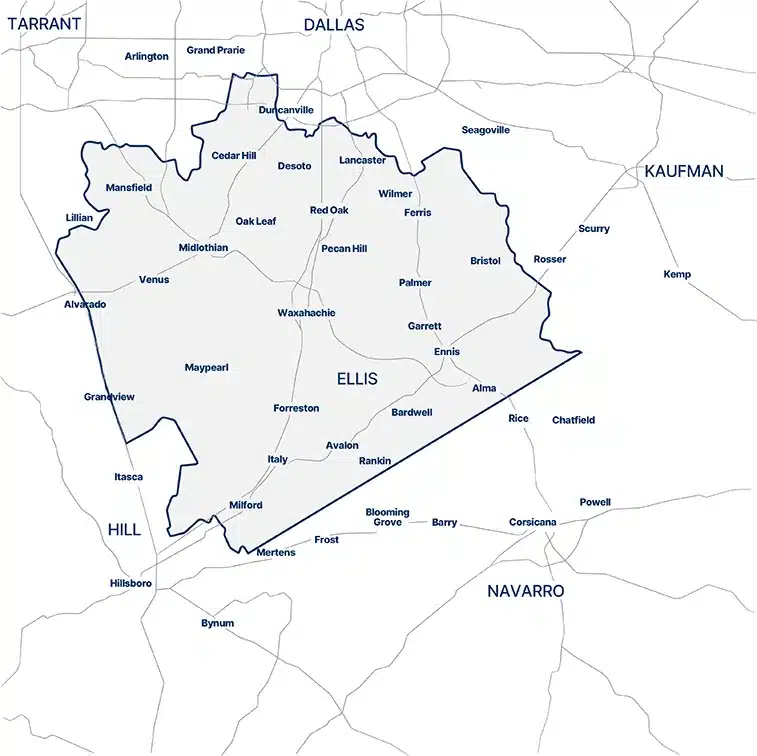
OUR SERVICE AREA
WE LOVE ELLIS COUNTY
We make Ellis County our home base, and proudly serve these cities in these areas...
- Alvarado
- Avalon
- Cedar Hill
- Dallas
- Desoto
- Duncanville
- Ennis
- Ferris
- Forreston
- Grandview
- Italy
- Lancaster
- Mansfield
- Maypearl
- Midlothian
- Milford
- Palmer
- Oak Leaf
- Ovilla
- Red Oak
- Venus
- Waxahachie
- Wilmer


